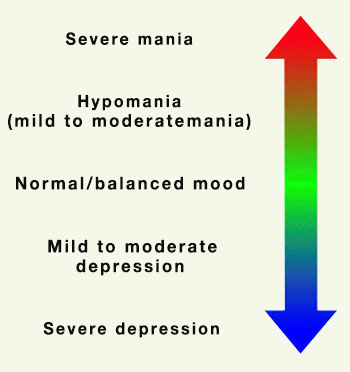Individuals diagnosed with Bipolar Disorder (BP) at times have great difficulty navigating day-to-day life due to extreme fluctuations in mood. For people with Bipolar Disorder who are untreated maintaining healthy relationships can seem impossible, accomplishing personal goals may seem unattainable, and feelings of hopelessness may even loom. However, when properly treated people with Bipolar Disorder live wonderful and fulfilling lives. Let’s get into a brief overview of Bipolar Disorder before taking a look at some concrete strategies individuals with BP could use to manage their symptoms.
Bipolar Disorder is a mental disorder that causes unusual shifts in mood, energy, activity level, concentration and the ability to carry out day to day tasks. Bipolar disorder occurs in 2.5% of the population. Individuals with BP suffer from mood episodes that are often extreme and intense. Diagnosis can occur in one of two categories Bipolar I & Bipolar II. There are three distinct mood states:
- Manic is best described as being high energy or fast-paced either in speech, thoughts, or having difficulties with controlling impulsive decision making. Individuals experiencing a manic episode may participate in risk taking behaviors like driving a car at high speeds. They may even max out their credit cards with excessive shopping.
- Hypomanic is still an elevated mood state but is described as a little less intense than manic.
- Depressive is often described as feeling extremely tired, needing excessive sleep, extreme sadness and low or no interest in activities, or a sense of hopelessness. Individuals who are in a severely depressed state are at risk for suicide.
This mood disorder should be thought of on a spectrum where manic and depressive episodes are on opposite ends and healthy mood resides somewhere in the middle.

Now that we have a general understanding of what Bipolar Disorder is, let’s review some ways people with BP can manage their symptoms.
- Identify Triggers.
- Record your Mood in a Mood Journal.
- Establish a Daily Schedule.
- Have an Activity Planner.
- Medication.
Identifying triggers to both manic and depressive episodes by writing them down is a helpful tool to gaining awareness about what can initiate an episode. These triggers can be a number of things such as: arguments with loved ones, work/job stress, drug and alcohol use, or sleep deprivation.
For individuals with bipolar disorder, it is important to record how they are feeling. It is helpful to record details about mood like circumstances that might have preceded the mood (ex: an upsetting email at work, news of death of a family member, or a relationship breakup). The mood journal is great for self-monitoring and to keep record of when mood shifts might have occurred.
Allow time for recreational and leisure activities but as much as possible create a daily routine around times designated for eating and sleeping. Creating a routine offers a sense of structure and for individuals with Bipolar Disorder, sleep deprivation especially during the manic stages can be problematic.
Creating an activity planner can be beneficial for those who are in a depressed state. Not only does it serve as a reminder that there are daily tasks that need attention, but it will perhaps provide some impetus to discontinue excessive sleeping during the depressive stages of the disorder. Some examples of items to put on the activity planner are: going for a walk, taking the kids to the zoo, cleaning out the cabinets, or even going grocery shopping. The idea here is that activities on the activity planner will motivate movement and perhaps a change out of the sullen and isolated state of depression.
The decision to take medication for Bipolar Disorder is a personal one that should be thoroughly discussed with a therapist and a medical physician. Mood stabilizing medications for Bipolar Disorder have shown to be an effective means to controlling some of the symptoms. However, medication should be used in conjunction with strategies, like the ones that have been shared, to reduce the likelihood of experiencing some of the symptoms of BP.
We all should be cognizant of our emotional state. However, for individuals with Bipolar Disorder, it is especially important to be attuned to mood and mood changes. Having a plan with interventions readily available can be useful to avoid experiencing symptoms of BP. Showing compassion and understanding for self or others who are taking steps to managing their symptoms is key. Like any mental illness, Bipolar Disorder needs proper treatment and support. If you or a loved one is experiencing symptoms of Bipolar disorder, consult with a mental health professional.




0 Comments